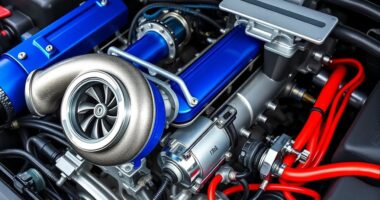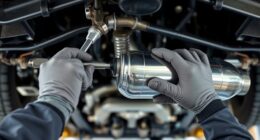Tuning your 2004 Volkswagen Jetta can release its true potential and give it a modern edge. Start with a performance cold air intake for better airflow and a more aggressive sound. Enhance power further with an extensive ECU tune, which could add up to 50 horsepower. Upgrading your exhaust system will not only improve power but also amplify engine notes. Don't forget suspension upgrades like lowering springs or coilovers for superior handling. With proper maintenance and these performance enhancements, your Jetta will drive just as thrillingly as contemporary sedans. There's plenty more to explore for the ultimate tuning journey.
Key Takeaways
- Upgrade your Jetta's performance with a cold air intake for improved airflow and throttle response, boosting horsepower by 5-15 HP.
- Consider ECU tuning to recalibrate your engine, which can yield significant gains of 30-50 HP at a cost-effective price.
- Enhance your vehicle's handling with upgraded sway bars and performance shocks for improved cornering stability and ride quality.
- Install aftermarket exhaust parts to reduce restrictions, increase efficiency, and enhance engine sound, providing a 10-20 HP gain.
- Regular maintenance, including checking the coolant temp sensor and oil pan gasket, ensures optimal performance and longevity of your upgrades.
Engine Performance Modifications
When you're looking to amp up your Volkswagen Jetta's performance, engine modifications are the way to go.
Start by considering a performance cold air intake; it enhances airflow, boosts throttle response, and gives your engine a more aggressive sound.
Next, think about upgrading your turbocharger. Installing a bigger turbo, like the K04 for MK4 Jetta 1.8T models, can greatly increase your engine's power when paired with the right intake and intercooler upgrades.
Don't forget about tuning your ECU with quality software. This upgrade can yield impressive horsepower gains and often offers the best dollar-per-HP value compared to other modifications.
Additionally, consider aftermarket exhaust parts. They reduce exhaust gas flow restrictions, improving engine efficiency and providing a more enjoyable auditory experience.
Regular maintenance is essential, too. Keep an eye on your Diverter Valve (DV); a leaky DV can cause boost leaks and lead to power loss.
Suspension and Handling Upgrades

Upgrading your Volkswagen Jetta's suspension can take the driving experience to the next level, complementing the engine performance modifications you've made.
One popular option is lowering springs, which subtly drop the ride height, improving both aesthetics and handling by lowering the center of gravity.
If you prefer full adjustability, consider coilovers; they allow you to customize your suspension settings for ideal performance on the street or track.
For a unique twist, Air Ride Systems enable you to adjust the ride height at the push of a button, providing flexibility based on driving conditions or personal preference.
Upgraded sway bars are another excellent choice, enhancing cornering stability and considerably reducing body roll, which leads to improved handling during aggressive driving.
Brake Enhancements

When you're looking to enhance your Volkswagen Jetta's braking performance, consider upgrading to ceramic brake pads.
They not only boost stopping power but also cut down on brake dust, keeping your wheels cleaner.
Pairing them with upgraded rotors can further improve heat dissipation and overall braking efficiency, ensuring you get the most out of your tuning efforts.
Ceramic Brake Pads Benefits
Switching to ceramic brake pads can considerably enhance your braking performance.
These pads offer remarkably better stopping power compared to traditional options, ensuring a safer driving experience, especially in high-performance situations. You'll notice improved performance in both cold and hot temperatures, allowing for consistent braking efficiency without the fade that can occur with organic pads.
One of the standout benefits of ceramic brake pads is their quieter operation.
This means you'll enjoy a more comfortable driving experience with minimal noise during braking. Additionally, ceramic pads produce less brake dust, keeping your wheels cleaner and reducing the frequency of cleaning.
Another advantage is their lifespan.
Ceramic brake pads typically last up to 50% longer than semi-metallic or organic pads, which can lead to reduced maintenance costs over time. This longevity means fewer replacements and less hassle for you.
Upgrading Brake Rotors
To enhance your braking system's performance, consider upgrading your brake rotors. By opting for slotted or drilled rotors, you'll markedly improve heat dissipation, which helps reduce brake fade during high-performance driving conditions. This upgrade guarantees that your brakes remain responsive, even when the heat is on.
Pair your upgraded rotors with ceramic brake pads for peak performance. These pads not only enhance stopping power but also produce less dust than traditional options, keeping your wheels cleaner and looking sharp.
If you're serious about performance, think about investing in big brake kits. They provide superior stopping power while also giving your Jetta a visual upgrade that catches the eye of fellow enthusiasts.
For even better performance, consider rotors made from high-carbon materials. They offer improved thermal stability and resistance to warping, guaranteeing consistent braking performance.
Remember, regular maintenance and inspection of your upgraded brake components are essential. This diligence will help confirm that your braking system performs at its best, especially as you make further power enhancements to your vehicle.
With these upgrades, you'll enjoy a safer and more exhilarating driving experience.
Essential Maintenance Tips

To keep your 2004 Jetta running smoothly, you'll want to focus on key maintenance components like the coolant temp sensor and intake manifold gasket.
Regularly inspecting these parts helps you catch potential issues before they escalate. Establishing a consistent inspection schedule guarantees your car stays in top shape, especially when considering tuning upgrades.
Key Maintenance Components
Maintaining your 2004 Volkswagen Jetta is fundamental for guaranteeing ideal performance and longevity. One important component to keep an eye on is the Coolant Temp Sensor (Green Top). Regularly inspect and replace it to assure accurate monitoring of engine temperature, which helps prevent overheating and guarantees optimal performance.
Next, the Intake Manifold Gasket should be checked periodically. If it's worn, replace it promptly to maintain a proper seal. A faulty gasket can lead to air leaks that negatively affect engine efficiency.
Don't overlook the Fuel Pressure Regulator either. Monitor it closely and replace it if you notice any signs of failure. A functioning regulator is essential for maintaining the correct fuel pressure, which is critical for efficient combustion.
Lastly, while it's not mentioned here, using Oil Pan Gasket Sealer can help prevent oil leaks, thereby maintaining a clean oil system for engine longevity.
Prioritizing routine maintenance of these key components can save you from larger, costlier issues in the future, enhancing your Jetta's overall reliability and performance.
Regular Inspection Schedule
Regular inspections are essential to keeping your 2004 Volkswagen Jetta running smoothly and avoiding costly repairs down the road. Adopting a regular inspection schedule helps you catch potential issues early, guaranteeing your performance upgrades deliver on their promise.
Start by checking vital components like the Coolant Temp Sensor, Intake Manifold Gasket, and Oil Pan Gasket. Neglecting these can lead to significant problems later.
Make it a habit to schedule oil changes every 5,000 to 7,500 miles. Use high-quality synthetic oil to maintain peak engine performance and longevity.
Also, inspect brake pads and rotors every 10,000 miles to guarantee effective braking performance and safety.
Air filters play an important role in engine efficiency, so monitor their condition and replace them every 15,000 to 30,000 miles.
Regularly inspect and clean your battery terminals every six months to prevent corrosion and guarantee reliable starting power.
Cost-Effective Upgrade Options

If you're looking to boost your 2004 Volkswagen Jetta's performance without draining your wallet, there are several cost-effective upgrade options worth considering. These enhancements can lead to noticeable horsepower gains while keeping your budget intact.
| Upgrade Option | Estimated Cost |
|---|---|
| Cold Air Intake | $150 – $300 |
| Aftermarket Exhaust System | Starting at $300 |
| ECU Tune | $400 – $600 |
| Ceramic Brake Pads | $100 – $200 |
| Oil Pan Gasket Sealer | $7.70 |
Upgrading to a performance cold air intake, for instance, can greatly enhance airflow to the engine, improving power output and throttle response. Additionally, aftermarket exhaust systems reduce restrictions, allowing for better engine efficiency. Regular maintenance parts like the oil pan gasket sealer, priced at just $7.70, are essential for the longevity of your performance upgrades.
You'll find that many reputable companies offer ECU tunes that provide impressive horsepower gains, often yielding an unmatched dollar-per-horsepower ratio. Finally, don't overlook budget-friendly upgrades like ceramic brake pads and slotted rotors, which improve stopping power without breaking the bank.
Popular Modifications Overview

When it comes to tuning your 2004 Volkswagen Jetta, several popular modifications stand out for their ability to greatly enhance performance.
These upgrades not only boost horsepower but also improve driving dynamics, making your sedan more enjoyable to drive.
Here's a quick overview of top modifications you should take into account:
- ECU Tuning: By recalibrating your engine's ECU, you can achieve impressive gains of up to 215 WHP. It's one of the most cost-effective performance upgrades you can make.
- Performance Cold Air Intake: Upgrading to a performance intake increases airflow and throttle response, resulting in more power and an aggressive sound that makes your Jetta more exciting.
- Aftermarket Turbo-Back Exhaust: This system enhances exhaust flow and sound while increasing horsepower, providing a more engaging driving experience.
Additionally, take into account installing a front mount intercooler to manage increased air temperatures and upgrading the diverter valve to maintain turbo response and prevent leaks.
These modifications work together to greatly elevate your Jetta's performance, ensuring you get the most out of your driving experience.
Community Engagement Insights

Engaging with the vibrant community of Volkswagen Jetta enthusiasts can greatly enhance your tuning journey. With over 295.2K posts and 41.8K members in the forum community, you can tap into a wealth of shared experiences and advice on performance upgrades. You'll find discussions about ECU tuning, cold air intakes, and exhaust systems, where members foster a collaborative environment for knowledge sharing.
By participating in this community, you'll gain access to invaluable insights for your tuning endeavors. Here's a glimpse of what you can expect:
| Community Engagement | Performance Upgrade Insights |
|---|---|
| Troubleshooting Tips | ECU Tuning Experiences |
| Installation Guidance | Cold Air Intake Recommendations |
| Maintenance Tips | Exhaust System Comparisons |
| Modification Documentation | Real-Life Performance Results |
| Event Opportunities | Networking with Fellow Enthusiasts |
Events like TDIFest offer a chance to connect in person, share your experiences, and learn about the latest tuning trends. By engaging with this community, you'll not only enhance your knowledge but also build lasting connections that can enrich your Volkswagen Jetta tuning experience.
Tuning Options for Jetta 1.8T

When tuning your Jetta 1.8T, consider starting with an ECU software upgrade to release impressive horsepower gains.
Pairing this with a performance air intake will enhance airflow and throttle response, giving your engine a more aggressive tone.
ECU Software Upgrades
ECU software upgrades for your 2004 Volkswagen Jetta 1.8T can reveal impressive performance gains, boosting horsepower by as much as 30-50 HP with the right tuning options.
Upgrading your ECU is one of the most effective performance upgrades you can make, transforming your driving experience.
Here are three key benefits of ECU software upgrades:
- Enhanced Power Output: A stage 1 ECU tune can bring your power output to around 215 WHP, a significant boost over the stock performance.
- Optimized Engine Performance: Tuning options like GIAC and APR optimize boost, fueling, and ignition maps, ensuring your engine runs more efficiently.
- User-Friendly Flexibility: Many solutions come with software that allows you to easily switch between different tuning maps, catering to various driving conditions or fuel types.
Additionally, consider upgrading the Transmission Control Unit (TCU) alongside the ECU.
This can enhance performance further by allowing for faster shifts and higher RPM limits, particularly beneficial for automatic or dual-clutch models.
Embrace these ECU software upgrades to access your Jetta's full potential!
Performance Air Intake
After optimizing your Jetta's ECU for better performance, the next logical step is upgrading the air intake system.
A performance air intake can greatly increase airflow to your engine, enhancing both power and throttle response. Unlike factory systems designed for low-end torque, performance cold air intakes improve combustion efficiency, resulting in extra horsepower. This makes them a popular modification choice among Jetta 1.8T enthusiasts.
Leading brands like K&N and Neuspeed offer a variety of cold air intake options tailored for the Mk4 Jetta 1.8T, ensuring you get a system that fits perfectly and enhances performance.
Installing one of these intakes not only boosts engine efficiency but also provides a more aggressive sound that'll turn heads.
Additionally, effective cold air intakes help lower intake air temperatures, further improving your engine's power potential, especially when paired with other upgrades like ECU tuning.
Exhaust System Enhancements
Upgrading your 2004 Volkswagen Jetta 1.8T's exhaust system can greatly boost your ride's performance and sound. A performance exhaust system not only enhances exhaust gas flow but also increases horsepower and torque, creating a more aggressive exhaust note that turns heads.
To maximize your Jetta's performance, consider these key enhancements:
- Turbo Back Exhaust: This system covers everything from the turbo down to the exhaust tip, greatly reducing back pressure and improving engine efficiency.
- Quality Brands: Look into options from reputable manufacturers like Borla and MagnaFlow, which can yield power gains of 10-20 horsepower depending on your specific setup.
- Aesthetic Appeal: Aftermarket exhaust systems come in various finishes, including polished stainless steel and black ceramic coating, adding a stylish touch to your vehicle.
Installation typically requires minimal modifications and can be completed in just a few hours, making it a practical upgrade for enthusiasts.
With a new performance exhaust system, your Jetta 1.8T won't just run better; it'll sound better too, giving you that exhilarating driving experience you crave.
Market Trends in Performance Parts

The market for performance parts, especially for vehicles like the 2004 Volkswagen Jetta, is booming as enthusiasts seek cost-effective ways to enhance their cars. You'll find that the demand for VW/Audi performance parts has been steadily rising, particularly among those looking to improve horsepower (HP gain) without breaking the bank.
Online sales platforms have made it easier to access niche performance upgrades, fueling the DIY modification trend. Popular modifications for the Mk4 Jetta 1.8T include engine tunes, performance cold air intakes, and aftermarket exhaust systems. These components are often discussed on various Volkswagen enthusiast websites, where community engagement is thriving.
Here's a snapshot of current market trends:
| Performance Upgrade | Estimated HP Gain | Popularity Rating |
|---|---|---|
| Engine Tunes | 15-30 HP | High |
| Cold Air Intakes | 5-15 HP | Medium |
| Aftermarket Exhaust | 10-20 HP | High |
| Tuning Chips | 20-40 HP | High |
| Intercooler Upgrades | 10-25 HP | Medium |
With these trends, you're well-positioned to modernize your Jetta.
Resources for DIY Modifications

For those looking to plunge into DIY modifications for their 2004 Volkswagen Jetta, numerous resources are available to guide you through the process. Engaging with these tools and communities can help you achieve impressive performance upgrades while gaining invaluable knowledge.
Here are three essential resources to take into account:
- Enthusiast Forums: Websites like TDIClub host over 31.2K threads dedicated to performance enhancements. You'll find advice, guides, and support from fellow Jetta owners who've been down the same road.
- Installation Guides and Videos: Many popular upgrades, such as ECU tuning and intercooler installations, come with detailed DIY installation guides and video tutorials. These step-by-step instructions simplify the modification process, making it accessible for you.
- Local Car Clubs: Connecting with local car clubs can offer hands-on assistance and shared experiences. You'll also discover tips and tricks from fellow enthusiasts that can enhance your DIY modifications.
Frequently Asked Questions
How to Increase Horsepower in a Jetta?
To increase horsepower in your Jetta, consider upgrading the ECU with a tune, installing a performance cold air intake, replacing the exhaust system, or adding a larger turbocharger for significant power gains and improved performance.
How to Make Mk4 Jetta Faster?
You might think speed upgrades are too complicated, but making your Mk4 Jetta faster is straightforward. Start with a performance tune, add a cold air intake, and upgrade the exhaust for noticeable horsepower gains.
How Much Does It Cost to Get a Tune up on a Volkswagen Jetta?
Getting a tune-up for your Volkswagen Jetta typically costs between $300 and $800 for a basic ECU tune. If you want additional performance upgrades, expect to spend up to $1,500 or more for an extensive package.
Can You Mod a VW Jetta?
Absolutely, you can transform your VW Jetta into a roaring beast! With various mods like ECU tuning, cold air intakes, and upgraded suspension, you'll elevate its performance, handling, and style to exhilarating new heights.
Conclusion
By embracing these tuning options, you're not just upgrading your 2004 Volkswagen Jetta; you're breathing new life into your ride, transforming it into a spirited companion on the road. With every performance tweak, you'll feel the thrill of the drive and the joy of mastery over your vehicle. So, roll up your sleeves and immerse yourself in the world of modifications—your Jetta is waiting to be released, ready to turn heads and capture hearts wherever you go.










